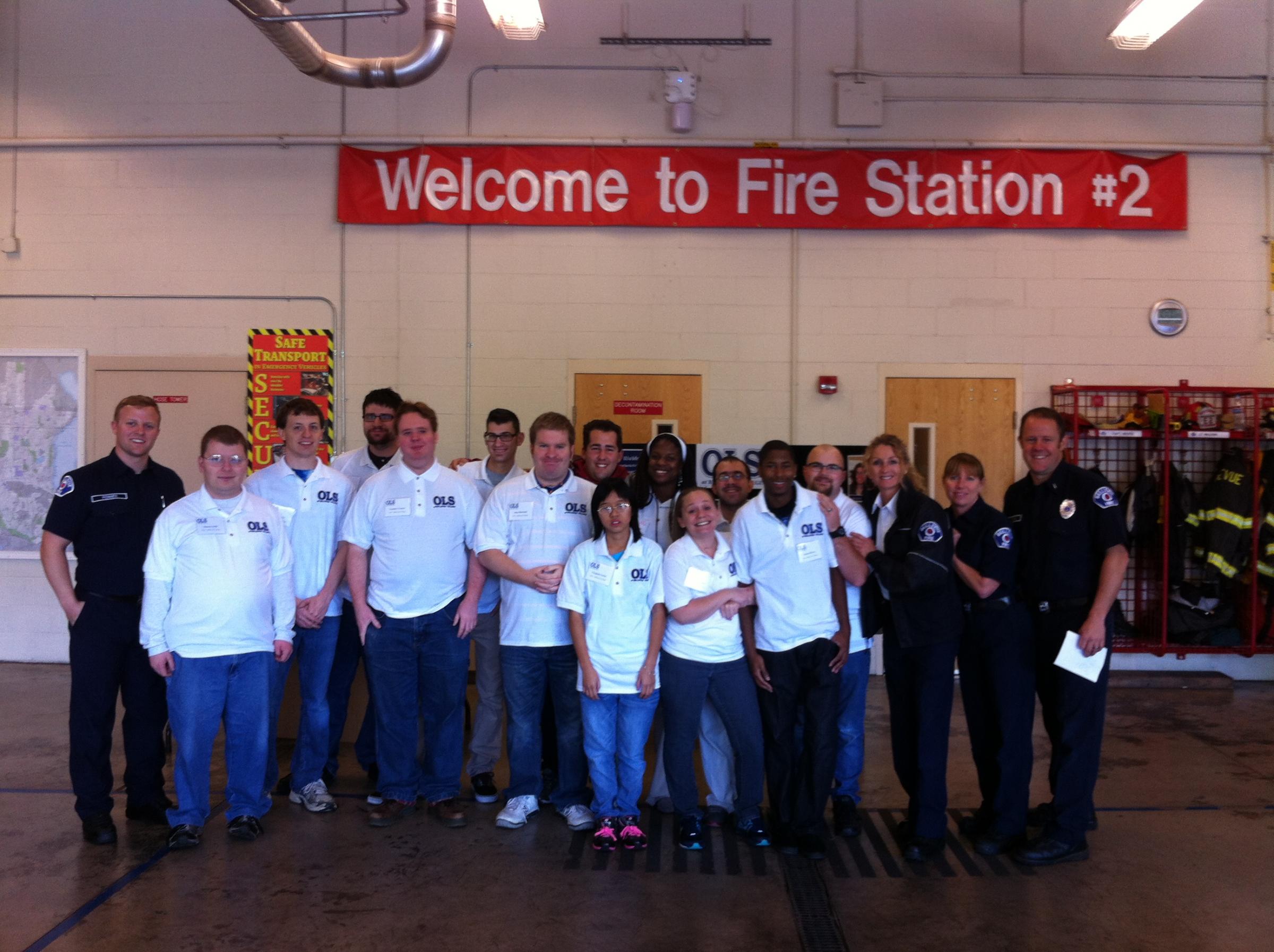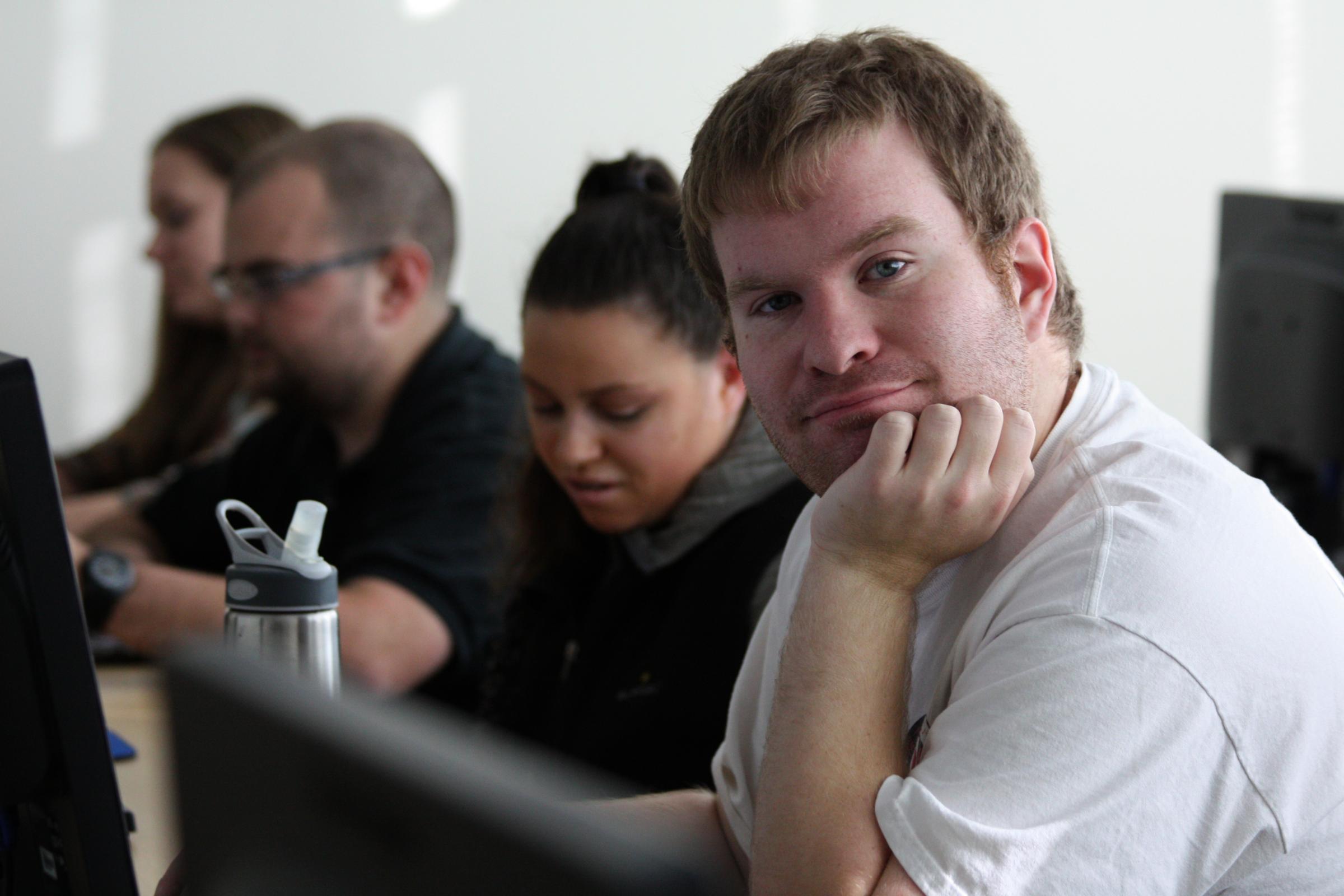Bellevue College: A Program as Unique as Its Students
On the second floor of an otherwise unassuming office building in Bellevue, WA, Donna Hudson is leading a lecture on environment and community. It's the type of scene you'd expect to see in a movie depicting college life: The professor asks a question of the class and in short order, a lively discussion is underway that quite possibly brings up more questions than are asked. It's the kind of student-teacher rapport most of us rarely get to experience—let alone on a regular basis.
As class progresses, however, it becomes clear that this class is more than just a picture-perfect college experience. This class is preparing students to look beyond the coursework and establishing how the topics at hand can parlay into the big picture: how the students affect the environment around them and how the environment then informs their actions.

The unique program of study to which these students belong is called Occupational Life Skills (OLS)—an associate degree program at Bellevue College for adults with cognitive disabilities. The program offers scaffolded instruction to teach and prepare students to become self-determined, contributing citizens and successful employees. Twenty-first century skills are infused into the curriculum focusing on critical and social thinking and self-determination. During the four-year program, students develop a career pathway, expand interpersonal skills, take part in service learning, and participate in internship experiences.
OLS students are what Program Director, Marci Muhlestein, calls tweeners. They are adults who are often overlooked as potential college students. Some take a couple of college courses elsewhere, but drop out because the traditional college classroom doesn't work for their learning style, while others are in a pattern of being hired and fired because they may not fit in to the work culture.
"Many of our students are those who have previously fallen through the cracks in the higher ed system," said Muhlestein. "Everyone (in the program) has different disabilities, but they all have the desire to be in college—to pursue a degree—and move forward."
Most OLS students have multiple learning disabilities and have difficulty concentrating, remembering, or making decisions, which interferes with their ability to learn in a traditional college environment. And the majority of students have multiple diagnoses, which may include a significant learning disability, sight impairment, attention deficit hyperactivity disorder, an autism spectrum disorder, or traumatic brain injury.
Once accepted into the OLS program, students are placed in a cohort of 12. This cohort then learns together during the four-year, 90-credit program—experiencing their highs and lows together as a community and serving as a tight-knit support network for one another.
Demand for the program is high and as such, OLS is home to a geographically diverse student body, attracting students from as far away as Florida and Hawaii. Some students spend upwards of two hours commuting to campus each day. Muhlestein hopes this program will grow over the years to meet this demand, increasing new cohorts from 12 to 24 students.
It Takes a Village
The start of what became OLS at Bellevue College began over a decade ago when a group of eastside parents, frustrated over the lack of choices afforded their children, came together with Bellevue College Continuing Education to create personal enrichment classes in which students developed a toolkit for working and socializing at work and at home. With each passing year, these enrichment classes grew in popularity and within four years, organizers took the necessary steps to create an accredited program.
By December 2006, a 90-credit associate degree in occupational and life skills began recruitment for the following fall. And by the following year, OLS as it is known today came into its own and has been thriving ever since.
Addressing the Employment Gap
People with disabilities are three times less likely to have a job than people without disabilities, and if they are employed they tend to be paid less, according to a report released by the United States Census Bureau (2013). More than half of workers with disabilities earn less than $25,000 a year.

To address this disparity, OLS at Bellevue College courses incorporate service learning in the community with local businesses such as Youth Care, Little Bits, and the Ronald McDonald House as a way to help students employ new skills outside of the classroom. Students create a career pathway over a three-year period that is specific to their skills, strengths, and passions. This career pathway translates into a 200-hour internship completed during a student's last two quarters. Often, these mutually beneficial internships translate into jobs post-graduation and most students are employed in their career pathway within three months after graduation.
Katie Lynn Fournier, a current OLS student and brain injury survivor, plans to go into rehab counseling to work with similarly effected people in the community. "Right now I'm volunteering with The Brain Injury Association of Washington, and in January I'm going to start interning there," she said.
OLS was the best choice for me, because they go further than just teach you. They help you grow, and realize what you're worth, and where you want to go in your life. Then in your final year they help you find, and place you in an internship in the career of your choice.
In King County, the number of people ages 18 to 64 with a cognitive disability is just over 50,000, with only 25 percent of those employed in any capacity. In contrast, 85 percent of OLS program graduates are employed, with an average pay of over $11 per hour compared to most persons with disabilities, who are paid minimum wage if they are employed at all.
"One of our main goals here is to see all our graduates gainfully employed, making a livable wage, and contributing financially and socially to their communities," said Muhlestein. "We're providing a space where they can learn more about something they are passionate about so that they become agents in their own lives."
Taking It on the Road
Muhlestein says the aha moment that the OLS program was really on to something came during a poster presentation at an AHEAD Conference, a professional organization focused on the development of policy and in the provision of quality services to meet the needs of persons with disabilities in higher education. During her session, she found herself swarmed by colleagues wanting to know how they could implement something similar: They all wanted a piece of what's made this program so successful.
So, with several years of successful programming under their belt and positive feedback from the BC Board of Trustees, Muhlestein and the OLS program staff developed best practices curriculum and systems that has been packaged to share with other higher education institutions around the country. In the past year, they've met with several community and technical colleges. Five of these meetings have led to partnerships in which OLS staff will begin the process of moving toward replication on these campuses.
"We want to educate as many people as possible to help to elevate the employment rate for adults with cognitive disabilities and really help them move forward in a life where they are happy and can contribute to their communities," said Muhlestein.
Resources
U.S. Census Bureau. (2013, March). Workers with a disability less likely to be employed, more likely to hold jobs with lower earnings, Census Bureau Reports. Newsroom. Washington DC: Author. Retrieved from http://www.census.gov/newsroom/releases/archives/american_community_survey_acs/cb13-47.html










